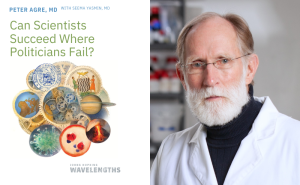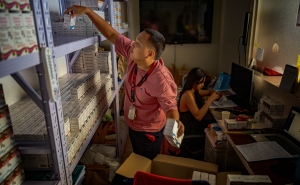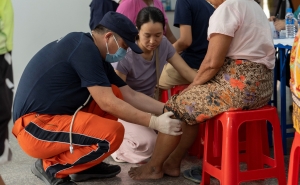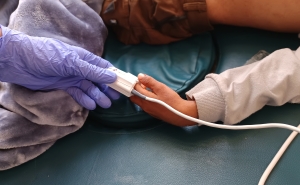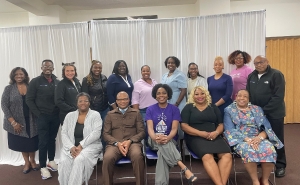Meet the Women Behind the Power of Public Health
This month, we celebrate the heroines of public health.
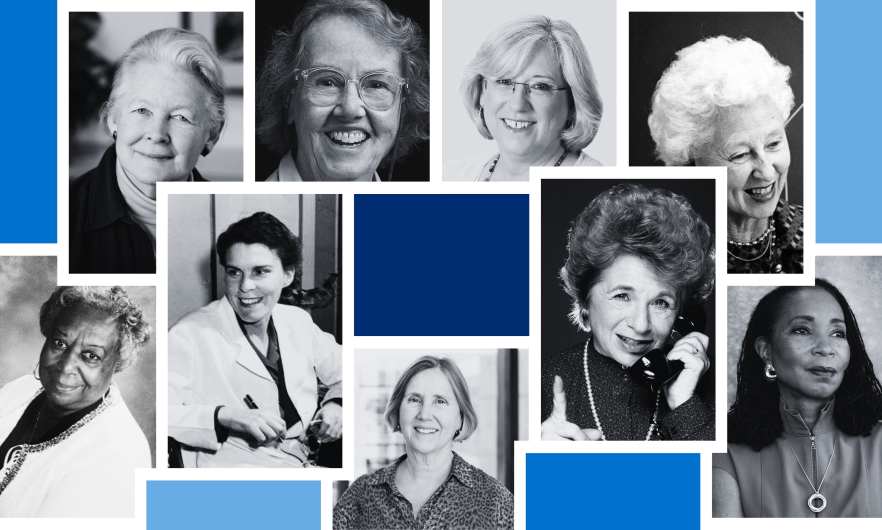
Women have long been integral to public health—though they haven’t always received recognition for their work.
Today, they make up 70% of the global health workforce and 90% of frontline health workers. In honor of Women’s History Month, we’re celebrating some of the women who have shaped the field of public health—the innovators and trailblazers who faced adversity, broke barriers, and made life-changing—and lifesaving—discoveries.
These leaders and experts were nominated by Bloomberg School faculty who were inspired by their transformative contributions across diverse public health fields and institutions.
Anna Baetjer
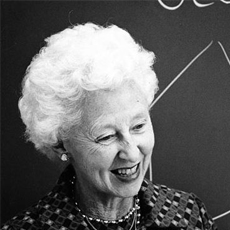
Anna Baetjer, ScD, was a strong-willed Baltimore native known for her independence, enthusiasm, and foresight, whose career at Hopkins spanned 60 years. An enthusiastic and devoted teacher, Baetjer was best known for her research into the health effects of industrial work on women and for her discovery of the carcinogenic properties of chromium. The safety standards she helped put in place—to protect workers from exposure to carcinogens and other toxins, and to mitigate the effects of stress, heat, humidity, and other hazards—helped prolong the lives of millions around the world.
“Anna devoted her lifetime career at Johns Hopkins to the improvement of worker health and safety across many industries, including the heavy industry that dominated Baltimore during the 20th century. She was a pioneer in many respects and the founder of our toxicology program,” says John Groopman, PhD, Edyth H. Schoenrich Professor of Preventive Medicine and professor in the Department of Environmental Health and Engineering. "The thing that really impresses me is that if you look at the papers that she published in the ’20s and ’30s, they're every bit as relevant today as they were then. They're tackling issues that we still view as being critically important: air pollution, heat and humidity, and stress, for example."
Susan P. Baker
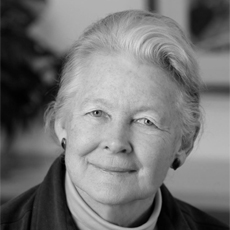
Susan P. Baker, MPH ’68, dedicated her professional life to bringing awareness of the importance of injury prevention practices to the forefront of public health policymaking. An injury epidemiologist, she is known for defining the field of injury prevention as a public health discipline, and was the founding director of the School’s Center for Injury Research and Policy. Her research over six decades includes studies on transportation safety, occupational safety, and aviation safety, as well as suffocation, drowning, burns, and poisoning. Preventing injury to children has been a major focus. Her landmark study in the late 1970s on childhood motor vehicle deaths was a crucial factor in the passage of child passenger protection laws throughout the U.S., which required child seat belts and infant and child restraints. Baker developed the widely used Injury Severity Score and has been recognized with numerous honors for leadership in her field.
“She’s like the Johnny Appleseed of the science,” says Stephen Teret, JD, MPH ’79, professor emeritus in Health Policy and Management. “She planted the seeds of injury prevention in the minds of so many people. … She goes from the initial discovery of a problem to formulating policies and then advocating for their enactment. There are very few people who do that, and there are very few people who can do that, because it requires very different skill sets.”
Lisa Coussens

Lisa Coussens, MD, PhD, is the deputy director for Basic and Translational Research at the Knight Cancer Institute at Oregon Health and Science University and chair of the Cell, Developmental, and Cancer Biology Department. An internationally renowned cancer biologist, her work describing the sequence of the cancer-causing gene HER2 was central to the development of the breast cancer drug Herceptin, which was FDA-approved in 1998 and is estimated to have saved more than 3 million lives to date. Coussens went on to make seminal contributions to cancer research, including some of the earliest studies to show a link between the immune system and the growth of cancer cells.
“Dr. Coussens’ work laid the foundation for research labs like ours to deliver ‘precision medicine' for cancer patients in 2024. Her work led to a shift in the way we think of cancer, from a bunch of cells in isolation to considering how the surrounding microenvironment around the tumors can be exploited to develop better anti-cancer therapies. Her tireless contributions to improving the human condition over her decades as a cancer researcher are truly inspiring,” says Utthara Nayar, PhD, assistant professor in Biochemistry and Molecular Biology. “Her career has several themes that should be galvanizing to all women scientists: letting her passions guide her career, seeking out mentors, embracing the new, and serving as a strong mentor in turn. She is a true public health heroine.”
Helene D. Gayle

Helene D. Gayle, MD, MPH ’81, is the 11th president of Spelman College in Atlanta. Before joining the HBCU, she was president and CEO of The Chicago Community Trust, with a primary focus on racial and ethnic equity in the Chicago area. She also served as the president and CEO of the international humanitarian organization CARE. As a public health physician, she spent two decades at the CDC with a focus on HIV/AIDS. She has directed initiatives on HIV/AIDS at the Bill & Melinda Gates Foundation, and served as the AIDS coordinator and chief of the HIV/AIDS Division of USAID. Gayle was also the first director of the National Center on HIV, TB, and STD Prevention.
“Dr. Gayle is a pioneer and leader in HIV prevention and public health. She recognizes the need to use multiple, tailored HIV prevention methods while simultaneously addressing structural factors such as racial/ethnic inequities and socioeconomic status,” says Liesl Nydegger, PhD, MPH, assistant professor in Health, Behavior and Society.
Lillie Jewel Tyson Head
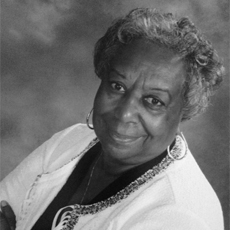
Lillie Jewel Tyson Head is the president of Voices for Our Fathers Legacy Foundation, an organization whose mission is to foster education, social justice, and medical research as a way of honoring the legacies of the 623 Black men, one of whom was her father, who were part of the Tuskegee Study of Untreated Syphilis in the Negro Male. The research, conducted from 1932 to 1972 by the U.S. Public Health Service, knowingly withheld treatment for syphilis to study the disease trajectory in Black men. The Foundation connects descendants across generations, provides annual scholarships to descendants, participates in the research project “The Untold Story,” and advises the Tuskegee University National Center for Bioethics in Research and Health Care. Previously, she was a health and physical education teacher in the Waterbury, Connecticut, public school system for 31 years.
“Mrs. Head was one of the keynote speakers for the Hopkins Center for Health Disparities Solutions’ 2023 Symposium and her message about structural racism, forgiveness, and acceptance was moving. She regularly speaks about a need for reconciliation and restorative justice in health care, which, from her perspective, is inspirational!” says Keshia Pollack Porter, PhD '06, MPH, professor and Bloomberg Centennial Chair of Health Policy and Management.
Nan M. Laird
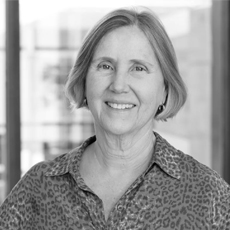
Nan M. Laird, PhD, is the Harvey V. Fineberg Professor of Biostatistics (Emerita) at the Harvard T.H. Chan School of Public Health. During her more than 40 years on the faculty, she developed popular and widely used methods for meta-analysis, longitudinal data, and statistical genetics. Her work on the EM Algorithm is among the 100 most cited of all published articles in science. She was a co-recipient of the third International Prize in Statistics in 2021 for her work on longitudinal data. Her applications work includes childhood obesity, genetic studies in Alzheimer's disease, bipolar disorder, asthma, and lung disease.
“Her research has had an impact on our Department's research focus on data integration methods and statistical genetics among other things,” says Nilanjan Chatterjee, PhD, MS, Bloomberg Distinguished Professor in Biostatistics, Medicine, and Epidemiology.
Isabel Morgan
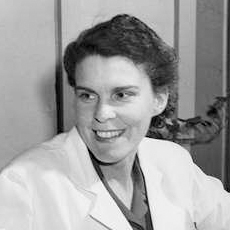
Isabel Morgan, PhD, was a pivotal figure in the race to develop a polio vaccine. After earning a doctorate in bacteriology, Morgan worked at the Rockefeller Institute for six years before being recruited by polio researcher David Bodian to the Johns Hopkins School of Medicine. With March of Dimes funding, her team sought to immunize monkeys against polio. Other preeminent virologists of the day believed a vaccine could only be achieved using a live virus, but Morgan thought otherwise. After five years of work, her team became the first to successfully create a killed-virus vaccine that was effective in animal models.
“Dr. Morgan was ahead of her time—a PhD-trained virologist in a very male-dominated field. If she had continued her work into human trials, we likely would have had a vaccine against polio even sooner,” says Kawsar Talaat, MD, an associate professor in International Health.
“Isabel Morgan was truly a pioneer in the field of polio research and a brilliant scientist. What she was able to accomplish at that time and as a woman is just remarkable. In addition to her scientific accomplishments, she was an exceptionally kind and thoughtful person. My hope is that students here at the Bloomberg School—and people everywhere—take time to learn about her interesting and accomplished life, so that her legacy is uncovered,” says J. Marie Hardwick, PhD, vice chair of research and David Bodian Professor in Molecular Microbiology and Immunology.
Edyth Schoenrich
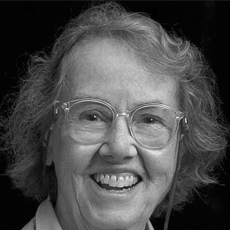
Edyth Hull Schoenrich, MD, MPH ’71, was a trailblazer in preventive medicine, known for her work at the local and state levels to improve the quality and accessibility of care for the poorest and sickest chronic disease patients. In her 70-plus years with Johns Hopkins, she held faculty and leadership positions in the schools of Public Health and Medicine. In 1977, Dr. Schoenrich, one of only three female students in her medical school class, became the first female associate dean at Johns Hopkins University when the Bloomberg School named her associate dean for Academic Affairs. She later directed the part-time professional programs and served as associate chair of the MPH Program from 1986 until 2018.
“Edyth was a pioneer in public health and for over 50 years was the impetus behind our now world-renowned part-time MPH program. As a mentor, scholar, and visionary she influenced the career trajectories of thousands of our faculty and students towards the betterment of public health,” says John Groopman, PhD.
“Edyth was, simply put, a force of nature,” says Ellen J. MacKenzie, PhD ’79, ScM ’75, dean of the Bloomberg School. “She embodied the mission of the School and committed her life to improving health and saving lives. Central to this commitment was the training of the next generation of public health professionals. She shaped so many lives in a very real and personal way—including my own.”
Ruth Westheimer
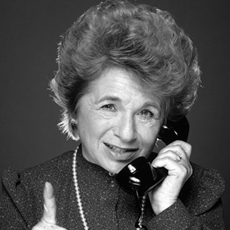
Ruth Westheimer, PhD, known as "Dr. Ruth," is an expert in sex education and therapy—and a celebrity. Beginning in the 1980s, she addressed the stigmatized and often awkward subject of sex and sexuality through her radio and television programs. With straight talk and facts, she enlightened her national audience on a broad range of sex-focused topics, particularly the importance of practicing safer sex. Now 95, Dr. Ruth has authored 45 books on sex and sexuality. Among her accolades is Planned Parenthood’s Margaret Sanger Award.
"Dr. Ruth has served as a beacon of inspiration for countless public health practitioners and researchers, myself included,” says Michelle Kaufman, PhD, MA, an associate professor in Health, Behavior and Society. “Her fearless approach to addressing stigmatized health issues has instilled confidence and curiosity within us all. Through her candid discussions on sex and sexuality, particularly as an older woman, she has shattered the barriers of stigma surrounding this vital aspect of human health. I vividly recall drawing inspiration from her as I embarked on my journey as a gender and sexuality researcher."
Morgan Coulson is an editorial associate in the Office of External Affairs at the Johns Hopkins Bloomberg School of Public Health.

